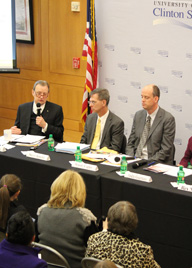Panel Examines Report on Immigration in Arkansas
Arkansas ranked fourth in the nation in immigrant population growth from 2000 to 2010, according to a three-volume report released Tuesday, Jan. 8, by the Winthrop Rockefeller Foundation.
 UALR Chancellor Joel E. Anderson joined a panel of experts at the Clinton School of Public Service to discuss the report, which examines demographic trends and the economic impact of the state’s immigrant population.
UALR Chancellor Joel E. Anderson joined a panel of experts at the Clinton School of Public Service to discuss the report, which examines demographic trends and the economic impact of the state’s immigrant population.
The panel also included Dr. Randy Capps, the head researcher on the study from the Migration Policy Institute; Dr. Steve Appold of the Kenan Institute of Private Enterprise at the University of North Carolina at Chapel Hill, who also contributed to the report; Dr. Andre Guerrero, director of the Arkansas Department of Education Programs for Language Minority Students; Rex Nelson, Arkansas Democrat-Gazette columnist and president of Arkansas’s Independent Colleges and Universities in Little Rock; and Randy Zook, president and CEO of the Arkansas State Chamber of Commerce.
The discussion was moderated by Dr. Sherece West-Scantlebury, the president and CEO of Winthrop Rockefeller Foundation. The first two volumes of the report focus on the state’s workforce, family demographics, and economic impact, while the third volume is a profile of the Marshallese community in Arkansas.
“We need to think beyond the costs, the economic cost, the balances. It’s a great historic time. I like to think that this just makes our state more interesting. It makes it richer in terms of its culture,” Guerrero said.
According to the report, Arkansas’s foreign-born population increased by 82 percent in a 10-year span, with many immigrant families remaining in the U.S. In 2010, 57 percent had lived in Arkansas (or elsewhere in the country) 10 years or more.
Anderson addressed the future of higher education in Arkansas and the importance of increasing access to education to all families that reside in the state.
“There is just a very great state interest in having a state population with more and more people who have a college education,” said Anderson. “In a world that now is categorized by a global economy, with people in Arkansas … competing with people halfway around the world – education becomes an important tool, qualification, or asset.”
Anderson listed a number of reasons why increasing access to education for children of undocumented immigrants would be beneficial to the state. Individuals who obtain a college degree “are less dependent on government and others for financial support. They have better health and make fewer demands on the health care system,” he said.
The UALR Institute on Race and Ethnicity has found benefits of adopting legislation to allow children of undocumented immigrants to attend public institutions of higher education at in-state rates.
The full report is available on the Winthrop Rockefeller Foundation site.